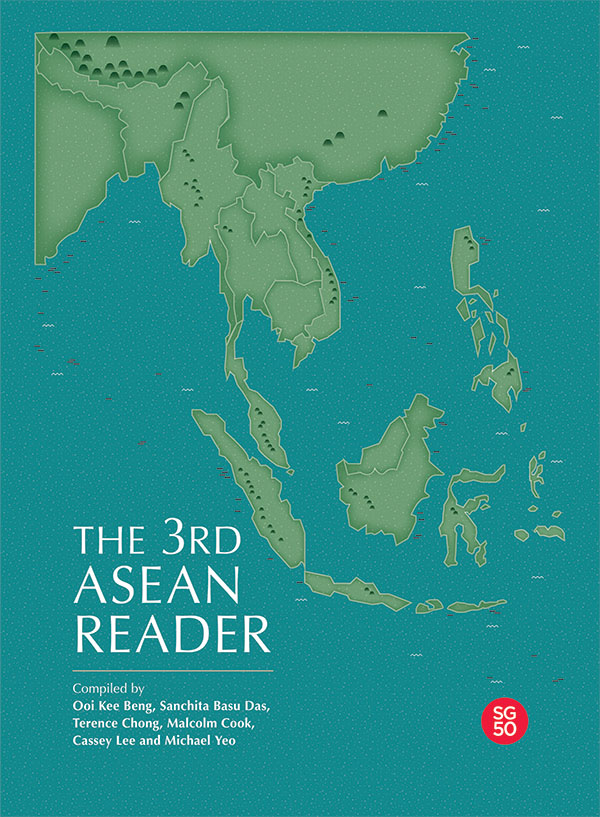Book contents
- Frontmatter
- Contents
- Preface
- Forewords to the First and Second ASEAN Reader: ASEAN: Conception and Evolution
- Forewords to the First and Second ASEAN Reader: ASEAN: The Way Ahead
- Forewords to the First and Second ASEAN Reader: New Challenges for ASEAN
- SECTION I ASEAN: THE LONG VIEW
- SECTION II COUNTRY ANALYSES
- SECTION III COMPARATIVE ANALYSES OF THE REGION
- Southeast Asian Societies
- The Southeast Asian Economy
- Southeast Asian Politics
- SECTION IV INTERNATIONAL DEVELOPMENTS
- Section Introduction by
- 25 Is There a Southeast Asian Development Model?
- 26 Global Production Sharing, Trade Patterns, and Industrialization in Southeast Asia
- 27 Chinese Trade Policy After (Almost) Ten Years in the WTO: A Post-Crisis Stocktake
- 28 Southeast Asia Beyond the Global Financial Crisis: Managing Capital Flows
- 29 Impact of Eurozone Financial Shocks on Southeast Asian Economies
- 30 The Collective Influence of Smaller States in the US-China Security Dilemma
- 31 China and Japan in “ASEAN Plus” Multilateral Arrangements: Raining on the Other Guy's Parade
- SECTION V INSTITUTIONS OF ASEAN
- SECTION VI ASSESSING ASEAN'S INTERNAL POLICIES
- ASEAN Political Security Community
- ASEAN Economic Community
- ASEAN Socio-Cultural Community
- SECTION VII ASSESSING ASEAN'S EXTERNAL INITIATIVES
- ASEAN Processes
- ASEAN's Major Power Relations
- SECTION VIII SOUTHEAST ASIA: PERIPHERAL NO MORE
- Bibliography
- The Contributors
- The Compilers
28 - Southeast Asia Beyond the Global Financial Crisis: Managing Capital Flows
from SECTION IV - INTERNATIONAL DEVELOPMENTS
Published online by Cambridge University Press: 22 June 2017
- Frontmatter
- Contents
- Preface
- Forewords to the First and Second ASEAN Reader: ASEAN: Conception and Evolution
- Forewords to the First and Second ASEAN Reader: ASEAN: The Way Ahead
- Forewords to the First and Second ASEAN Reader: New Challenges for ASEAN
- SECTION I ASEAN: THE LONG VIEW
- SECTION II COUNTRY ANALYSES
- SECTION III COMPARATIVE ANALYSES OF THE REGION
- Southeast Asian Societies
- The Southeast Asian Economy
- Southeast Asian Politics
- SECTION IV INTERNATIONAL DEVELOPMENTS
- Section Introduction by
- 25 Is There a Southeast Asian Development Model?
- 26 Global Production Sharing, Trade Patterns, and Industrialization in Southeast Asia
- 27 Chinese Trade Policy After (Almost) Ten Years in the WTO: A Post-Crisis Stocktake
- 28 Southeast Asia Beyond the Global Financial Crisis: Managing Capital Flows
- 29 Impact of Eurozone Financial Shocks on Southeast Asian Economies
- 30 The Collective Influence of Smaller States in the US-China Security Dilemma
- 31 China and Japan in “ASEAN Plus” Multilateral Arrangements: Raining on the Other Guy's Parade
- SECTION V INSTITUTIONS OF ASEAN
- SECTION VI ASSESSING ASEAN'S INTERNAL POLICIES
- ASEAN Political Security Community
- ASEAN Economic Community
- ASEAN Socio-Cultural Community
- SECTION VII ASSESSING ASEAN'S EXTERNAL INITIATIVES
- ASEAN Processes
- ASEAN's Major Power Relations
- SECTION VIII SOUTHEAST ASIA: PERIPHERAL NO MORE
- Bibliography
- The Contributors
- The Compilers
Summary
RECENT TRENDS IN CAPITAL FLOWS
Southeast Asia was one of the first regions to recover from the recent global economic meltdown. While the region posted an anaemic 1.2 per cent growth in 2009 — its worst performance since the 1997 Asian financial crisis — the outlook for Southeast Asia in 2010 and beyond is buoyant. The five economies that bore the brunt of the crisis — Brunei Darussalam, Cambodia, Malaysia, Singapore and Thailand — have all recovered rapidly.
Southeast Asia's bullish outlook and relatively high interest rates have attracted a massive influx of capital, with the region's emerging markets becoming an attractive destination for footloose liquidity from global funds. These have flown into financial and equity markets in the main, although some have arrived as foreign direct investment (FDI). The two-year peaks of price-to-book values have increased in all major Southeast Asian markets — by a factor of 3.4 for Indonesia's JKSE, 2.1 for the Philippines’ PSI, 1.9 for Malaysia's KLSE, and 1.7 for both Singapore's FTSTI and Thailand's SETI — all well above pre-crisis levels. This rally in the region's stock markets is expected to continue in the near term, as the economies continue to perform above expectations, and as risk-taking investors rotate money to underpriced financial assets.
POST-CRISIS CAPITAL FLOWS: POLICY ISSUES AND CHALLENGES
In theory, capital inflows should offer substantial benefits to Southeast Asian countries in terms of improving resource allocation and filling financing gaps, facilitating cross-border transfers of knowledge and technology, improving risk diversification, and promoting financial market reforms, provided that host countries are equipped with absorptive capacity and sound economic fundamentals. These benefits are usually associated with FDI in productive sectors, but what if the majority of the inflow is short term in nature? In reality, the recent surge in volatile capital has complicated macroeconomic policy management and has the potential of compromising economic stability, putting the region at risk of succumbing to another round of financial distress.
The large volume of volatile capital flows raises a number of policy challenges. First, expectations of currency revaluations and further interest rate increases in order to curb rising inflation will inevitably attract speculative capital flows. This is already evident in some Southeast Asian countries like Indonesia, Malaysia and Thailand, where real exchange rates have kept appreciating despite central banks’ intervention in the foreign exchange markets.
- Type
- Chapter
- Information
- The 3rd ASEAN Reader , pp. 150 - 152Publisher: ISEAS–Yusof Ishak InstitutePrint publication year: 2015

